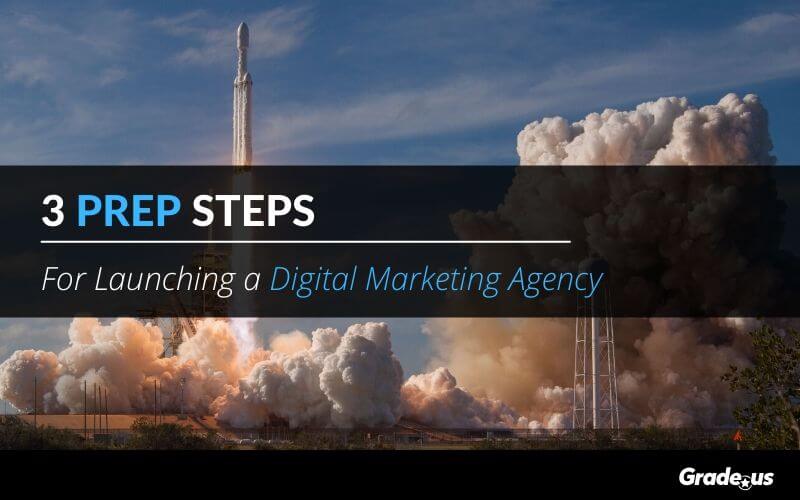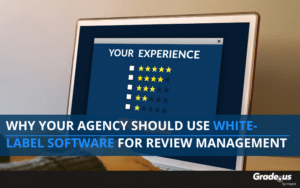What’s the first thing you do when you build a house?
If you said, “Build a foundation,” bzzat, you’re wrong. There are a ton of other steps you have to take before you get anywhere near building that foundation.
Prep steps.
You have to find a piece of land, and do the due diligence it takes to make sure there’s no hidden legal or environmental trouble lurking in your patch of grass. Then you’ll need to develop a budget and a blueprint. You’ll have to research, vet, and choose contractors. Then you’d need to draw up a schedule to ensure all the work proceeds in an orderly fashion.
Then you’d put down the foundation. Or have your foundation guy do it for you, anyway.
Building a digital marketing agency is exactly the same. Many people believe that building a website (the foundation) is step 1. In reality, you shouldn’t even think about registering a domain name until you’ve done a lot more prep work.
When you build a house, the prep steps are well-known. They’re a little fuzzier for digital entrepreneurs.
I hate fuzzy. Nobody can act on fuzzy.
Fuzzy ends today. Here are three steps you can use to make sure your agency gets off to a great start.
Step 1 - Grow your skills
Let’s get the basics out of the way first. Don’t launch an SEO agency if you don’t know how to do SEO.
Go work for someone first. Or, at least, do some volunteer work for free after educating the crap out of yourself.
You’d be surprised how many people don’t take that essential step. Even so, “basic competency” is more like Step Zero. Let’s assume you’ve got that and move on to the other skills you’ll need to grow.
Business owner skills.
“Choosing to build your own agency means you are a business owner first and a marketing expert second. That means you spend a lot more time on tasks like sales strategies, CRM configurations, billing, and finance managing than you do on creating splashy and engaging marketing campaigns,” notes Michael Calandra, Co-Founder and CEO of Snap-Back Digital.
To say nothing of taking on tasks like hiring and team leadership.
This can be a tough adjustment for creatives and technicians alike: people who want to launch an agency primarily because they love what they do.
The adjustment may require you to reach out to professional contacts who can help you along the way, to read like crazy, or to take classes and seminars. Pursuing all of this information can also help give you a good idea of whether you really want to take on this role. It’s a whole new ball game, especially when you hire employees who are now counting on you to bring in the revenue.
Step 2 - Develop a marketing plan
The landscape guy often has the worst lawn in the neighborhood, but you don’t want to let that happen to you. There’s nothing worse than being a marketing agency without a marketing plan.
For one, it makes you look like you don’t know what you’re doing. For example, we’ve all seen the local SEO agency who is completely invisible on Google Maps.
For another, it makes it real hard to find clients.
Paige Arnoff-Fenn of Mavens and Moguls urges you to do your research before you craft that marketing plan.
“It takes the risk out of the decision if you let the data drive you instead of your emotions. And it’s crucial to know your target audience, to understand what matters to them. By doing your market research, you can refine your message to stay relevant to their needs.”
This is the point where I tell you a story of how I once fell flat on my face. An embarrassing story.
I’ve been a solo consultant for over 10 years, so I feel like I’ve got that dance down.
This story is about the year 2016, in which I decided I wanted to launch a “real agency.”
I decided all the services I was going to offer, how I was going to price them, how I was different, all that stuff. You know what I didn’t do?
Any market research.
Any marketing planning.
You know what I did do? Spent $6,000 buying a whole bunch of tools I anticipated needing to use, before I had anyone to use them for. Once I had all that in place, I felt like a real agency owner. I was ready!
Except I totally wasn’t, because I had absolutely no idea how to score the first client. I’d decided who I was going to serve (home services professionals, as it happens), but I’d never exactly figured out how to reach them. Except, of course, via digital marketing, but I didn’t even have a plan in place to do that: no idea what content to write or where to put it. I didn’t have a budget left to do PPC and I didn’t have any idea of where I could go that might help me network my way into some business. I didn’t even know what would make your average electrician or roofer choose one marketing company or another.
I have a sales background, so I could have winged it by cold calling. I even wasted hours developing a huge list.
I’d also left sales years ago because cold calling is something like the 5th circle of Hell for me. Sure, if I’d called 500 folks across America there was a decent chance some of them would have hired me…numbers games are what they are and sometimes you get lucky.
I didn’t manage to make even one call, because by the time I’d worked out how badly I’d screwed up I had lost all confidence in whether any of this would work at all. I went back to doing what I was doing, a little poorer, and a little wiser.
I will absolutely back Arnoff-Fenn on this market research bit, because fast-forward to three years later, where I did develop a marketing plan for a brand new business. I did it backwards, completing the plan first and the research second.
In terms of digital marketing acumen, the plan was very solid. It just relied on a few incorrect assumptions about my target market. Back to the drawing board, but at least I didn’t spend $6K doing it this time.
These stories also demonstrate why it’s a good thing that I have some successful agency owners to talk to about this stuff, because otherwise it would be real hard to write this article! Even if these stories are a perfect morality play all about exactly why creating a website is not, and will never be, “Step 1.”
Step 3 - Create the process
What is the difference between creating a business that you can scale and creating a job for yourself?
Arguably, it’s all in the processes you create.
“You must have well-defined processes in all aspects of your business,” notes Mabeel Keblawi, owner of Provectus Digital. “In fact, I would go so far as to say that if you don’t have any replicable and repeatable processes meticulously documented on paper, then you have nothing. No process, no business.”
Jonathan Aufray, Owner and Founder of Growth Hackers, agrees. “Creating SOPs is essential. Having clear standard operating procedures is crucial so you can train people. It allows you to on-board your employees so you can grow your agency faster.”
A process is nothing more than a document outlining: “how we do things.”
At a minimum, you will want one for on-boarding clients, one for managing client workflow, one for managing your own marketing workflow, and one for making sales.
These processes aren’t set in stone. You’re going to be messing with them a lot. Eventually you’ll spot ways they could be better and you’ll tweak them. That is, in fact, one of the essential tasks of any business owner.
In order to do that, though, you need to have some in the first place, and they need to be written out and kept in a place where you can reference them on the regular.
Running a business is a lot like building a machine. Developing processes prior to launch gives you the chance to see what that machine will look like when you crank it up. It will help you spot weaknesses or places where you may not be equipped to do a very good job. You can then correct those weaknesses before they get you into big trouble with your clients.
Complete the steps, and then get in there
These steps are meant to give you a foundation so you can eventually launch a completed marketing agency. They won’t do that if your next step isn’t moving right on to the work.
Or as Arnoff-Fenn puts it: “You can’t wait for the perfect time to launch. You just have to course correct as you get more feedback along the way. Being an entrepreneur means making decisions without perfect information.”
Doing your prep work first just means you can do all of that with the confidence and the framework you need to succeed.









